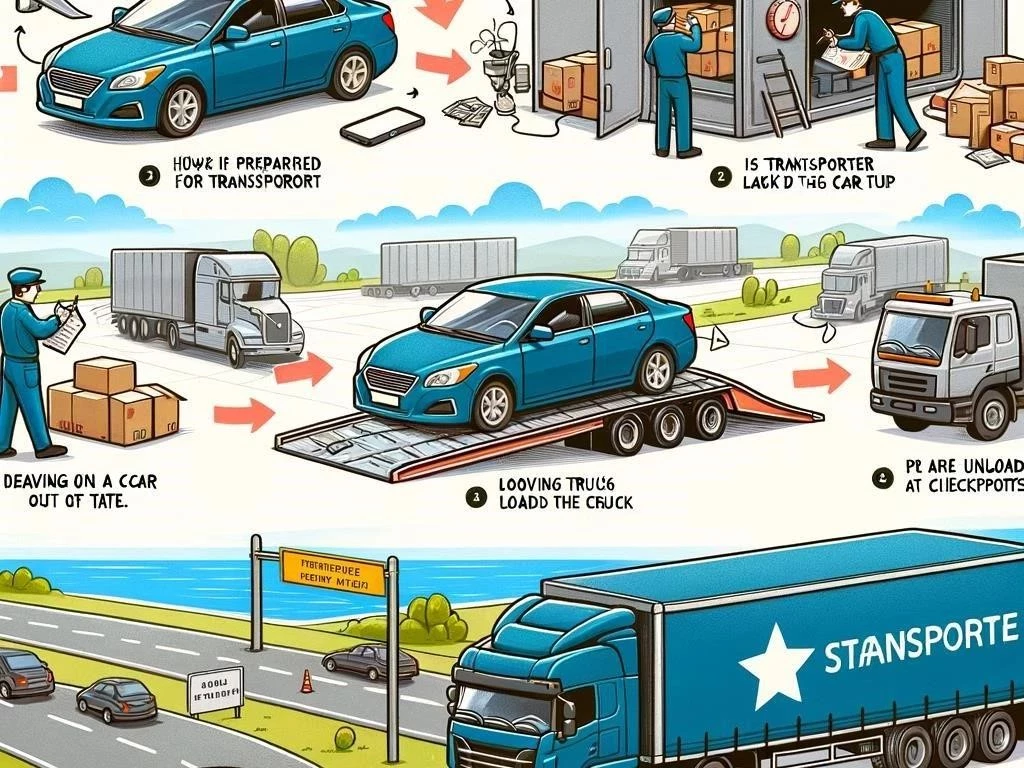How to Ship a Car Out of State
Shipping a car out of state requires careful planning. Understanding various transport options, selecting reliable auto transport companies, and knowing shipping regulations can ensure a smooth vehicle relocation experience for your needs and destination state.
Understanding Car Transport Options
When considering car transport, it’s essential to explore various options available for your interstate vehicle delivery. The two primary methods are open transport and enclosed transport. Open transport typically involves a flatbed truck or trailer transport, allowing for multiple vehicles to be shipped simultaneously. This option is often more cost-effective, but your vehicle may be exposed to weather and road debris during transit.
On the other hand, enclosed transport provides a protective environment, shielding your vehicle from elements and potential damage. This method is especially recommended for luxury or classic cars, but it usually comes with higher shipping costs. Additionally, auto transport companies may offer door-to-door service, which simplifies the pick-up and drop-off process.
It’s crucial to consider logistics and vehicle insurance when choosing a transport option. Researching customer reviews can also guide your decision. Ultimately, understanding these car transport options will ensure you select the right method for your vehicle relocation needs.
Choosing the Right Auto Shipping Method
When selecting the best auto shipping method for your cross-state shipping needs, several factors should be considered. Begin by assessing the condition of your vehicle and its value, as these elements will influence your choice. For high-value or classic cars, enclosed transport is often preferred due to added protection against potential damage.
Next, evaluate your budget and shipping costs. Open transport tends to be more affordable, making it an attractive option for standard vehicles. However, if you prioritize safety and vehicle condition, the additional expense of enclosed transport might be justified. Look for transport quotes that align with your budget while offering reliable service.
Additionally, consider the shipping duration and the logistics involved in pick-up and drop-off locations. Some companies provide door-to-door service, which can save time and hassle. Research auto transport companies by reading customer reviews to gauge their reliability and professionalism. Ultimately, thorough evaluation will help you choose the right shipping method for your specific needs.
Comparing Shipping Costs and Quotes
When planning to ship a car out of state, comparing shipping costs and quotes from various auto transport companies is crucial. Start by obtaining multiple transport quotes, as prices can vary significantly based on factors like distance, vehicle type, and transport method. Ensure that you specify details such as pick-up and drop-off locations, vehicle condition, and desired shipping options to receive accurate estimates.
In addition to price, consider what services are included in the quotes. Some companies may offer vehicle insurance, while others might charge extra for this essential coverage. Pay attention to shipping duration and logistics, as these factors can also impact costs. Understanding the different payment methods accepted by auto transport companies is vital, as this can influence your decision.
Don’t forget to read customer reviews to gauge the reliability of each company. By thoroughly comparing shipping costs and quotes, you can make an informed choice that meets your budget and ensures a smooth vehicle relocation experience.
Preparing Your Vehicle for Interstate Delivery
Proper preparation of your vehicle is essential for a successful interstate delivery. Start by thoroughly cleaning your car, both inside and out. This allows you to inspect the vehicle condition for any existing scratches or dents, ensuring you can document them before transport. Take detailed photos from various angles to have a record of your vehicle’s state.
Next, remove all personal belongings, as auto transport companies typically prohibit items inside the vehicle during transport. This helps avoid potential damage and theft. Also, ensure your vehicle’s gas tank is only a quarter full, minimizing weight while still allowing the vehicle to be moved easily.
Check fluid levels, tire pressure, and battery condition to ensure the vehicle is roadworthy. Additionally, disable any alarms or anti-theft devices to prevent issues during transport. Finally, ensure that you have all necessary paperwork, including transport permits and registration requirements, ready for the auto transport company. This preparation will help ensure a smooth vehicle relocation process.

Selecting a Reliable Auto Transport Company
Choosing a reliable auto transport company is crucial for a successful out-of-state vehicle shipping experience. Begin by researching various auto transport companies that specialize in interstate vehicle delivery. Look for companies with a solid reputation, as indicated by positive customer reviews and testimonials. You can find these reviews on independent websites and forums dedicated to automotive logistics.
Check if the company is licensed and insured, as this ensures compliance with shipping regulations and protects your vehicle during transport. Inquire about their experience with cross-state shipping and whether they offer various shipping options, such as open or enclosed transport. Ask for transport quotes and compare the services included, such as vehicle tracking and insurance coverage.
Contact potential companies to discuss your specific needs and assess their customer service responsiveness. A reliable company should be transparent about shipping costs, payment methods, and any required transport permits. By taking the time to select a trustworthy auto transport company, you can ensure a smooth and secure vehicle relocation process.
Navigating Shipping Regulations and Permits
Navigating shipping regulations and permits is a vital step in the process of shipping a car out of state. Each state has specific regulations regarding vehicle transport, and it’s essential to familiarize yourself with these to ensure compliance. Start by checking the registration requirements of both the origin and destination states, as they may differ significantly.
Some states may require transport permits, especially for oversized or specially modified vehicles. Consult with your chosen auto transport company, as they are often well-versed in state-specific shipping regulations and can assist you in obtaining necessary permits. Additionally, understanding shipping regulations related to vehicle insurance is important, as it protects you against potential damages during transit.
Be sure to keep all documentation organized and accessible, as you may need to present it during pick-up or drop-off. By thoroughly researching and navigating shipping regulations, you can avoid potential delays and complications, ensuring a smooth vehicle relocation process for your interstate shipping needs.
Tracking Your Vehicle During Transport
Tracking your vehicle during transport is an important aspect of ensuring peace of mind while shipping a car out of state. Most reputable auto transport companies provide vehicle tracking services, allowing you to monitor your car’s location in real-time. This feature is particularly beneficial for long-distance shipping, as it keeps you informed about your vehicle’s journey and estimated arrival time.
Before finalizing your choice of an auto transport company, confirm that they offer a reliable vehicle tracking system. Some companies utilize GPS technology, while others may provide updates through phone calls or emails. Understanding the tracking process will help you stay connected with your vehicle’s status throughout the shipping duration.
In addition to tracking, communicate with the auto transport company for any updates or concerns during the transport process. This proactive approach can help you address any issues that may arise. By effectively tracking your vehicle during transport, you can ensure a smoother and more transparent shipping experience, minimizing any uncertainties regarding your vehicle relocation.
Post-Shipping: Inspecting Vehicle Condition and Registration Requirements
After your vehicle has been delivered, performing a thorough inspection is crucial to ensure it arrived in the expected condition. Start by comparing the vehicle’s condition with the pre-shipping documentation and photos taken before transport. Look for any signs of damage, scratches, or dents, and document any discrepancies immediately to address potential claims with the auto transport company.
Next, check all vehicle functions, including lights, brakes, and electronics, to ensure everything is operational. If you notice any issues, report them right away. After confirming the vehicle’s condition, you’ll need to address registration requirements for your destination state. Some states have specific regulations for newly relocated vehicles, including emissions testing and safety inspections.
Gather necessary paperwork, such as the title, proof of insurance, and bill of lading, to facilitate a smooth registration process. By diligently inspecting your vehicle and understanding registration requirements, you can ensure a successful transition and compliance with state laws after your interstate vehicle delivery.








